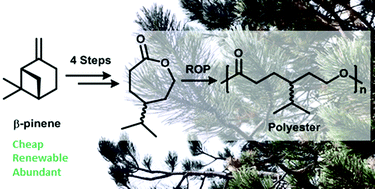Most current plastics are made from oil, which is unsustainable. Due to dwindling fossil fuel supply and growing environmental concerns, the demand for renewable and green plastics has intensified.
Thus, scientists from the Centre for Sustainable Chemical Technologies (CSCT) at the University of Bath have developed a renewable plastic from pinene, a naturally-occurring chemical species found in pine needles.
According to Professor Davidson, this would open the way to making new polymers from a renewable source, independent from petrochemicals. The outcomes could be very intense for the environment, and could revolutionise the chemical industry.
Some of the most common bio-derived monomers are α- and β-pinene (from gum turpentine) and D-limonene (from citrus waste), as well as isoprene. The authors believe that the abundance of double bonds in these molecules would allow for efficient cationic and radical polymerisation reactions, as well as epoxidation as a route to biodegradable oxygenated polymers.
Read the full story on the University of Bath website.
This article is Open Access.
Matthew D. Jones et al., Polym. Chem., 2017. DOI: 10.1039/C6PY02033J











